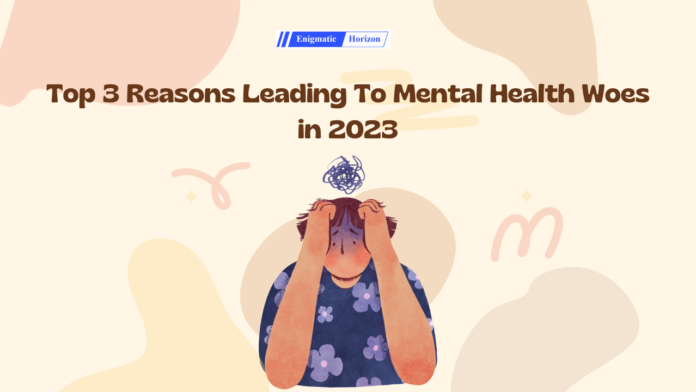Anurag Gade
Although it took a while, the World Health Organization (WHO) has finally classified depression as a wide-spread illness across the world. Even before the onset of COVID-19, several people used to die from suicide rather than wars, terrorism, diseases, or any other cause. When we dug in further, negative thoughts and emotions were found to be at the heart of the majority of these suicides. There has been a time when many of us have dealt with premature symptoms of anxiety or depression. Even though there are a lot of things going on in the background that lead to existential crises, the problems with our traditional education system are at the heart of each one.
However, it isn’t just the education system that has led us to this. Two more factors, in recent years, have been held responsible for an increase in mental health issues. So the question we all must be asking is: What has led to a drastic increase in mental illnesses?
Reasons Why Mental Illnesses are on the Rise
The world as we know it is currently experiencing a worldwide mental health crisis. While there is not one right answer that will explain this, understanding the factors responsible will help us get a clear picture of why mental illnesses are on the rise.
Here are our top three reasons that have significantly contributed to the worsening mental health situation worldwide.
Traditional Education System
Whether an illness affects you physically or mentally, the education system of the 21st century seems to be at the heart of each issue. And it certainly has come under the spotlight as a catalyst to increasing mental illnesses
over the past decade.
Over the years, education has become a noteworthy factor and an extremely strong factor for improved health and well-being. However, at the same time, compulsory schooling laws, legal obligations, and the explosion of education outlets have been the driving forces behind the rise of crippling anxiety and depression among both youth and adults.
From poor teaching standards to an overwhelming workload, all have contributed to education crippling the mental health of young people. This is because modern-day schools aren’t focused enough on the things that matter and have an added emphasis on passive learning techniques.
Hyper-Competitive Workplaces
The corporate world, as we all know, has been a racetrack ever since the beginning of time. As technology is advancing, the race only got faster and has now reached a hyper-competitive stage. All this seems to have significantly added to mental issues such as stress, anxiety, depression, and so on.
The worst affected are young working professionals who work tirelessly in a stiff corporate workplace while simultaneously aiming to achieve that work-life balance. As the corporate world gets more competitive, it only means putting in more hours to achieve more, including weekends.
A survey by Bengaluru’s National Institute of Mental Health and Neuro Sciences (NIMHANS) found that one in eight people has a mental illness and that more than 3 lakh people from the corporate sector seek psychiatric help each year.
Most of these candidates have very high stress levels, which leads to emotional problems like being alone, fighting with other people, having panic attacks, being depressed, and so on.
A change in demographics also marks a huge contributing factor. People migrating from rural areas find themselves in competition they’ve never seen or experienced before, causing them to be stressed right from day one.
Enhanced Consumerism
The sudden power of a consumerist world is another important factor that can cause or worsen mental health problems in people. Because of media convergence, the average consumer sees a lot of different ads on a lot of different platforms.
From demanding messages to glossy billboards, we are constantly exposed to needless advertisements in one way or another. These advertisements fuel interest, gradually leading a customer into making a purchase they don’t need.
The modern-day market is oversaturated, which ultimately makes everyone buy and try out new things before finding the one that is actually meant for them. All of this need to shop eventually traps us in a cycle of wanting, buying, and throwing away.
Furthermore, the more information one gains about a particular product, the more they are exposed to it. An internal report from Facebook earlier last year found that all forms of targeted advertisements encourage self-consciousness, causing more and more youngsters to feel insecure, overwhelmed, useless, and other things.
The Bottom Line
Our education system shows how different values are lived out in a very large human civilization. However, the traditional education system, as we know in recent years, has failed to equip an individual to comprehensively deal with the highs and lows of life.
While modern-day media has come a long way, media convergence has led to enhanced consumerism, which has not only had an effect on the human mind but has also been responsible for inducing anxiety and depression and negatively affecting self-consciousness among individuals.
A revolution in school, the workplace, and the outside is long overdue if the world wishes to tackle mental health woes effectively. Every good idea for improving mental health can have a positive effect on society as a whole.
